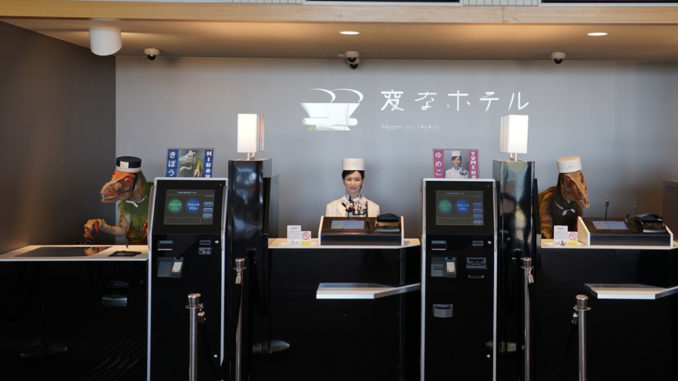
The Japanese have long been pioneers in developing robots to perform jobs traditionally done by humans. That being the case, it should be no surprise to learn that the country was the first to “staff” a hotel run almost entirely by robots. Not just machine-looking robots, mind you, but humanoid robots with lifelike gestures, including moving mouths and blinking eyes, that, for first-time guests, can elicit a simultaneous sense of awe, delight and creepiness.
Henn-na (which aptly means both “strange” and “strange” in Japanese) Hotel first opened its doors in 2015 at Nagasaki’s Huis Ten Bosch theme park and has opened a second property in Tokyo’s high-end Ginza shopping district this week. Now the hotel’s parent company, H.I.S., has announced plans to construct eight more humanoid robot-staffed Henn-na Hotels. According to the company, the plan is to build four robot-staffed hotels in the Tokyo area this year and four others in Osaka, Fukuoka, and Kyoto.
While the hotel brand has so far enjoyed success in deploying robots as a way to both draw in business and reduce staffing costs, which are significant given the country’s shrinking population, the novelty of being greeted and served by robots is no doubt part of the draw for guest, which include a growing number of foreign tourists. The impact on staff reduction and cost savings is nothing short of monumental. Originally, 30 staff members were assigned to work at the 140-room hotel. The robotic staff and automated check-in system enabled H.I.S. to reduce the number of staff to seven.
According to H.I.S., the company created the hotel in part to respond to societal issues in Japan. Recent reports indicate that there may be a shortage of as many as 3,000 hotel rooms in Tokyo for the 2020 Olympics. Robot-staffed hotels may be part of the solution to this problem. Whether, and how soon, the concept translates into other geographic markets — including, perhaps, other planets — is yet to be determined.
